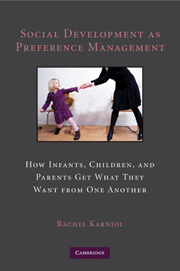 Social Development as Preference Management
Social Development as Preference Management Book contents
- Frontmatter
- Contents
- Acknowledgments
- Introduction
- 1 The Baby “Preference Game”
- 2 Children's Expression of Preferences
- 3 Emerging Meta-Preferences
- 4 Other People's Preferences
- 5 Parenting and Preference Management
- 6 Channeling Children's Preferences
- 7 Temporizing Preferences
- 8 Restricting Children's Preferences
- 9 Disciplining Noncompliance
- 10 Planes of Transformational Thought: Temporal, Imaginal, and Mental
- 11 Manipulating Others
- 12 Coping and Self-Regulating
- 13 Mind Play: Applying Transformational Thought
- 14 Minding One's Own Versus Others' Preferences: Altruism, Aggression, and Morality
- 15 Tying Up
- References
- Subject Index
- Name Index
14 - Minding One's Own Versus Others' Preferences: Altruism, Aggression, and Morality
Published online by Cambridge University Press: 05 June 2012
- Frontmatter
- Contents
- Acknowledgments
- Introduction
- 1 The Baby “Preference Game”
- 2 Children's Expression of Preferences
- 3 Emerging Meta-Preferences
- 4 Other People's Preferences
- 5 Parenting and Preference Management
- 6 Channeling Children's Preferences
- 7 Temporizing Preferences
- 8 Restricting Children's Preferences
- 9 Disciplining Noncompliance
- 10 Planes of Transformational Thought: Temporal, Imaginal, and Mental
- 11 Manipulating Others
- 12 Coping and Self-Regulating
- 13 Mind Play: Applying Transformational Thought
- 14 Minding One's Own Versus Others' Preferences: Altruism, Aggression, and Morality
- 15 Tying Up
- References
- Subject Index
- Name Index
Summary
5-year-old John objects to Adam taking blocks from him, saying, ‘Hey, don't take wood from my property.’ Adam answers, ‘Well, we're sharing wood.’ When John denies this, Adam returns the blocks. Later, John requests, ‘Hey, I need some of your wood, please?’ and Adam replies, ‘Here friend.’
(Pitcher & Schultz, 1983, p. 67)Knowing other people's preferences is a necessary but not sufficient prerequisite to becoming a social being. Sociality is determined by whether, and how, knowing other people's preferences has an impact on the pursuit of our own preferences. The way one's own behavior relates to other people's actual or presumed preferences guides the labeling and evaluation of behavior, both by those whose preferences are affected and by others who are privy to its impact. In this chapter, I discuss the interplay between our preferences and the preferences of others as this interplay is manifest in altruism, aggression, and morality.
HOW PREFERENCES RELATE TO ALTRUISM, AGGRESSION, AND MORALITY
Individuals can pursue their own preferences with, or without, regard to other people's preferences, yielding the following continuum, as illustrated in Table 14.1 and elaborated below.
Self-Regarding Behavior
As discussed by economists (e.g., Camerer & Fehr, 2006), behavior is self-regarding when it is undertaken in the pursuit of our own preferences without regard for other people's preferences. The inconsiderate or egoistic person does not evidence concern with the preferences, outcomes, or behavior of others, as long as they do not have an impact on the pursuit of his own preferences.
- Type
- Chapter
- Information
- Social Development as Preference ManagementHow Infants, Children, and Parents Get What They Want from One Another, pp. 292 - 315Publisher: Cambridge University PressPrint publication year: 2010


